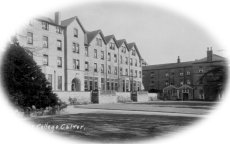Cliff College - a HistoryCompiled and edited by Rosemary Lockie, © Copyright 2004
The above image (old postcard) of the college is provided by Moyra Burnett. Moyra's grandfather Eugene WALTERS spent part of his training here. He was born in Plaistow Marsh near London, and attended Harley College in London, an Evangelical Training School founded by Henry Grattan GUINNESS, a member of the well known (and wealthy) Guinness Family. Harley College became so successful that it needed a larger home, and it is believed the site for Cliff College was offered to Guinness by Elizabeth HULME, the widow of Mr. HULME, a Recorder of Salford. Elizabeth was the daughter (and heiress) of Thomas GARDOM, the last in the male line of the family of GARDOM, who had lived at Cliff House (or ‘The Cliff’) at Curbar for several generations previously. Elizabeth had been impressed by Harley College when she visited, saying “This is what my husband had desired to see at Cliff”... The former Cliff House (built circa 1790) was refurbished, and “Cliff College” was born; although for a time afterwards it was known as “Hulme Cliffe College” in honour of its benefactor. During Moyra's grandfather's time studying here he met and married Moyra's grandmother, Eva NEEDHAM, from Ashford. They sailed to Jamaica in 1887 where he become a Baptist missionary. After living in Jamaica for a couple of years they moved to the USA, where in about 1893 he became a medical doctor. They returned to England again briefly, only to leave to live in Canada permanently in 1904. The easiest way for me to describe those early days of the college is by a short extract from Calver - A Booklet for the Millennium[1] which (I think) ably captures the prevailing essence of the college:-
[Quote]
The first Principal of the College was Thomas COOK, a much-admired leader. He died shortly before World War I to be succeeded by the Rev Samuel CHADWICK - a big name in the history of the College. It was in his time that the Whitsuntide Gathering was established. In its early days the local people set out trestle tables to feed and refresh the crowds who came to Cliff. Chadwick also organised Team Missions, when the students went on “trek”. They pulled handcarts containing their clothes and literature and held services in the open air or in church or chapel buildings. Now the students travel on their missions by car or minibus, but the spirit remains unchanged. [End Quote] Further information of yet another charismatic figure who had cause to influence events at ‘The Cliff’ has been kindly contributed by Rosie Riggall. A newspaper obituary in her possession - for the Rev. Thomas CHAMPNESS, a Wesleyan Minister she is researching for her own family history studies - makes reference to Cliff College having been purchased by the Rev. Thomas COOK for £13,000. The newspaper is probably one local to Lutterworth, where Rev. Champness died - his students had been transferred to Cliff College to continue their training when the lease on the college he founded - Castleton Hall, in Rochdale - ran out 18 months before his death. Castleton Hall had been established by the Rev Champness after he had been forced through ill-health to relinquish his ‘Joyful News’ Mission, and its associated Methodist newspaper, which he'd started just over 20 years previously. He began the training college using the profits from this publication, with the object of preparing young men for the ministry, and also to make them more efficient as local preachers. Apparently a great number of men entered the Wesleyan ministry by this means and many (like Moyra's grandfather) went out as foreign missionaries. In more recent times, the US Evangelist Billy Graham was a regular visitor to the College during the Whitsuntide Gatherings of the 1960s.
References: |
||||
